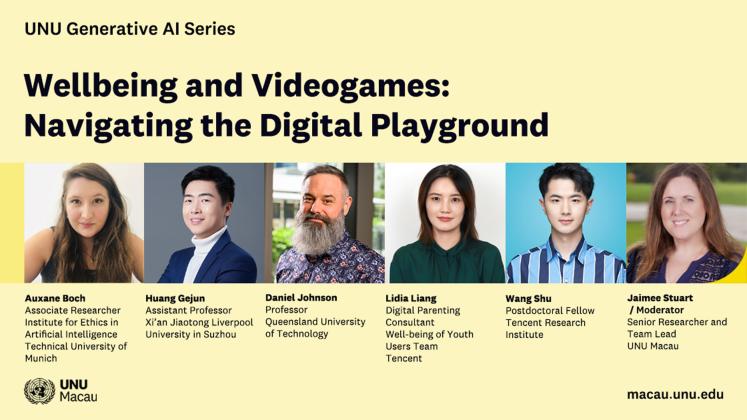Watch the full session:
Play is a central part of human experience that is widely known to provide critical developmental opportunities for learning and socialisation in childhood. But play is also important in both adolescence and adulthood, shaping leisure time, self-expression, and interactions with others throughout the life course. Yet, with increased access to technology and the growth of the video gaming industry, the nature of play has changed.
In fact, it is now estimated that 3.3 billion people engage in some type of video game playing and this number is expected to increase. In this context, many people, especially children and young people, have access to a diverse range of videogames that can offer avenues for entertainment, connection, and learning, potentially having many positive benefits for their development and wellbeing. But playing video games can become unhealthy or excessive among some young people, for example those who use it for escapism due to life stressors (e.g., academic pressures, anxiety, loneliness), those who do not have positive role models or formal education concerning digital use, and young people who have few recreational opportunities outside of video game contexts. Therefore, although videogames have been a part of social life for more than 40 years and is still growing in popularity, there are controversies and inconsistencies in understanding their impacts on health and wellbeing among young people.
As such, this webinar seeks to highlight the complexities, benefits and risks for young people with regards to video games and to understand the contexts and conditions that give rise to positive play experiences.
This webinar is sponsored by Tencent, in their capacity as a member of the UNU Global AI Network.
Panelists
Auxane Boch
Associate Researcher, Institute for Ethics in Artificial Intelligence (IEAI), Technical University of Munich
https://bochauxane.wixsite.com/auxane-boch

As a research associate at the Technical University of Munich's Institute for Ethics in AI, Auxane Boch had the chance to work on multiple AI ethics-related topics, such as education and AI, AI use during the Covid-19 pandemic, ethical implications from cultural perspectives, as well as AI in healthcare and general accountability for AI systems in Europe. As a doctoral candidate, her work focuses on the ethics of interactional technologies from a psychological perspective.
The Good, the Bad and the not so Ugly about Video Games Impacts
This presentation will explore the multifaceted interactions between video games and human users, delving into the various impacts that these interactions may have across different dimensions of life. We will provide an overview of the potential effects of video games on cognitive skills, social behaviours, and overall health and well-being. By examining these areas, we aim to contribute to a nuanced conversation about the design and utilisation of video games, considering both the positive and negative aspects. This talk seeks to foster a deeper understanding of how video games can be harnessed to promote positive outcomes while mitigating potential drawbacks, offering insights that are relevant across all age groups.
Huang Gejun
Assistant Professor at Department of Media and Communications at Xi’an Jiaotong Liverpool University in Suzhou, China
https://www.linkedin.com/in/gejun-huang-440a7a54/

Dr. Gejun Huang is an assistant professor in the Department of Media and Communication at Xi’an Jiaotong-Liverpool University. His research focuses on pressing issues that pertain to the digital game industry, media entrepreneurship, cultural policy and creative economy, digital inequalities, and digital privacy. His ongoing research project examines the parent-child relationship around digital privacy and gaming in contemporary Chinese household settings.
Does co-playing help? Digital gaming and digital parenting in Chinese families
Younger generations in China, especially children and adolescents, have drawn much public attention for playing central to the heated public discourses around the downsides of gaming, e.g., addiction. To most Chinese parents, these downsides are synonymous with the pressing issues of digital parenting they must wrestle with. In this regard, co-playing between parents and children has been proven effective in strengthening parent-child bonds. This presentation aims to depict a fuller account of co-playing and digital parenting in China. Drawing on an online survey of 1010 Chinese parents living in the Yangtze River Delta, we find that parents’ experience of co-playing is positively associated with their report of constructive means of digital parenting. Besides, parents’ reported enjoyment of co-playing is positively associated with their self-efficacy of guiding children’s screen time based on constructive means.
Daniel Johnson
Professor, Queensland University of Technology
https://www.linkedin.com/in/daniel-johnson-26598a6/

Professor Daniel Johnson is a national and international leader in understanding people’s interactions with technology in terms of their motivations to engage and the impact on their wellbeing. He has particular expertise in the player experience of videogames, the impact of videogames on wellbeing (including addiction), eSports, and how to apply the principles of games design in non-entertainment settings (gamification). Daniel has been chief investigator on projects involving over $45 million worth of funding from the Australian Research Council, National Health and Medical Research Council and industry sources (including the Movember Foundation, Cystic Fibrosis Queensland, Newcrest Mining, and UNICEF). He is a Chief Investigator for the Centre of Excellence for the Digital Child. He is ranked number 1 in the Asia Pacific (number 10 internationally) for his research on gamification.
Videogames and Well-being
Videogames are excellent sources of need satisfaction, providing opportunities for feelings of competence and autonomy as well as connections with others. Ultimately, the satisfaction of these needs, alongside experiences of flow and catharsis mean that videogames improve the wellbeing of players and moreover, can help with the management of difficult and stressful life events. It is no wonder that players often develop a strong passion for videogames. In most cases, this passion is harmonious but in some cases can become obsessive. Professor Johnson will speak about the context and conditions that can lead to one path or the other and the dangers associated with assuming that videogames themselves can be harmful.
Lidia Liang
Digital Parenting Consultant from Tencent Well-being of Youth Users Team

Ms. Lidia Liang, a Digital Parenting Consultant from Tencent's Well-being of Youth Users Team, has more than ten years of experience in educational consultation, specializing in parent-child relationships, communication during adolescence, and addressing teenagers' Internet addiction.
The Relationship Between Family Education and Children's Attitudes and Behaviors toward Online Gaming
This presentation delves into the significant influence of family education on children's attitudes and behaviors toward online gaming. It highlights how a higher level of parental digital literacy can positively shape children's understanding and responsible use of online games. Additionally, it explores the reciprocal effect of children's gaming habits on family education, often prompting parents to refine their guidance methods. Finally, the presentation discusses how online games, when managed appropriately within the family context, can stimulate children's creativity and interests. The discussion underscores the crucial role of informed and active parental involvement in promoting healthy gaming behaviors in children.
Wang Shu
Postdoctoral Fellow, Tencent Research Institute

Wang Shu is a Tencent-Tsinghua University joint postdoctoral fellow. His research interests include video game industry, games, and culture.
Gametech and Its Positive Impact on Youth
This presentation will examine the positive impact of game technology on youth, with a focus on two pivotal areas: game engines and game AI. We will begin by discussing these concepts and their evolution within the gaming industry. Following this, we will highlight Tencent's innovative approach, showcasing how the company utilizes game technology to inspire creativity among young people and contribute to the development of emerging AI talent.
Jaimee Stuart (Moderator)
Senior Researcher and Team Lead, UNU Macau
https://unu.edu/macau/about/expert/jaimee-stuart


